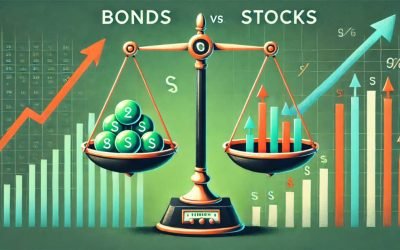Understanding Corporate Bonds: A Comprehensive Guide for Investors
Corporate bonds are a crucial component of the financial markets, offering investors a relatively stable and predictable income stream. This article delves into the essential information that investors need to know about corporate bonds, from their basic characteristics to the intricacies of bond ratings and market dynamics.
What Are Corporate Bonds?
Corporate bonds are debt securities issued by companies to raise capital. When an investor purchases a corporate bond, they are essentially lending money to the issuing company in exchange for periodic interest payments and the return of the bond’s face value upon maturity.
Key Features of Corporate Bonds
- Face Value: The amount the bond will be worth at maturity, also known as the par value.
- Coupon Rate: The interest rate the bond issuer will pay to the bondholder, usually expressed as a percentage of the face value.
- Maturity Date: The date on which the bond will mature, and the issuer will pay the bondholder the face value of the bond.
- Issuer: The company that issues the bond.
Types of Corporate Bonds
Corporate bonds come in various forms, each with unique characteristics and risk profiles. Understanding these types can help investors make informed decisions.
Investment-Grade Bonds
Investment-grade bonds are issued by companies with strong credit ratings. These bonds are considered low-risk and offer lower yields compared to high-yield bonds.
High-Yield Bonds
Also known as junk bonds, high-yield bonds are issued by companies with lower credit ratings. These bonds offer higher yields to compensate for the increased risk of default.
Convertible Bonds
Convertible bonds can be converted into a predetermined number of the issuing company’s shares. This feature provides potential for capital appreciation in addition to interest income.
Callable Bonds
Callable bonds can be redeemed by the issuer before the maturity date. This feature allows issuers to refinance debt if interest rates decline, but it introduces reinvestment risk for bondholders.
How Corporate Bonds Work
Corporate bonds function similarly to loans. When a company issues a bond, it agrees to pay the bondholder periodic interest payments (coupons) and repay the principal amount (face value) at maturity.
Interest Payments
Interest payments are typically made semi-annually, although some bonds may pay interest annually, quarterly, or monthly. The coupon rate determines the amount of interest paid.
Principal Repayment
At maturity, the issuer repays the bond’s face value to the bondholder. If the issuer defaults, the bondholder may not receive the full principal amount.
Factors Influencing Corporate Bond Prices
Several factors can influence the price of corporate bonds, including interest rates, credit ratings, and market conditions.
Interest Rates
Bond prices and interest rates have an inverse relationship. When interest rates rise, bond prices fall, and vice versa. This is because new bonds are issued with higher coupon rates, making existing bonds with lower rates less attractive.
Credit Ratings
Credit rating agencies assess the creditworthiness of bond issuers and assign ratings based on their ability to meet debt obligations. Higher-rated bonds are considered safer and typically have lower yields, while lower-rated bonds carry higher yields to compensate for increased risk.
Market Conditions
Economic conditions, investor sentiment, and geopolitical events can impact bond prices. For example, during economic downturns, investors may seek safer investments, driving up demand for high-quality bonds and increasing their prices.
Evaluating Corporate Bonds
Investors should consider several factors when evaluating corporate bonds, including credit ratings, yield, maturity, and the issuer’s financial health.
Credit Ratings
Credit ratings provide insight into the issuer’s creditworthiness. Ratings range from AAA (highest) to D (default). Investment-grade bonds have ratings of BBB- or higher, while high-yield bonds have ratings below BBB-.
Yield
The yield is the return an investor can expect to earn from a bond. It is influenced by the coupon rate, purchase price, and time to maturity. Yield can be expressed as current yield or yield to maturity (YTM).
Maturity
The maturity date indicates when the bond will mature and the principal will be repaid. Bonds with longer maturities typically offer higher yields to compensate for the increased risk of interest rate fluctuations and issuer default.
Issuer’s Financial Health
Assessing the issuer’s financial health involves analysing financial statements, debt levels, and profitability. Strong financial health indicates a lower risk of default.
Risks Associated with Corporate Bonds
While corporate bonds can offer attractive returns, they also come with risks that investors should be aware of.
Credit Risk
Credit risk is the risk that the issuer will default on its debt obligations. This risk is higher for lower-rated bonds.
Interest Rate Risk
Interest rate risk is the risk that changes in interest rates will affect bond prices. Rising interest rates can lead to falling bond prices.
Reinvestment Risk
Reinvestment risk is the risk that interest payments or principal repayments will be reinvested at lower rates. This risk is higher for callable bonds.
Liquidity Risk
Liquidity risk is the risk that an investor may not be able to sell a bond quickly at its fair market value. This risk is higher for bonds with lower trading volumes.
Benefits of Investing in Corporate Bonds
Despite the risks, corporate bonds offer several benefits that make them an attractive investment option.
Steady Income
Corporate bonds provide regular interest payments, offering a steady income stream for investors.
Capital Preservation
Investment-grade bonds are relatively low-risk, making them suitable for investors seeking to preserve capital.
Diversification
Corporate bonds can diversify an investment portfolio, reducing overall risk by spreading investments across different asset classes.
Potential for Capital Gains
If interest rates decline or the issuer’s credit rating improves, bond prices may rise, providing potential for capital gains.
How to Invest in Corporate Bonds
Investors can purchase corporate bonds through various channels, including brokers, bond funds, and exchange-traded funds (ETFs).
Direct Purchase
Investors can buy individual bonds through a brokerage account. This approach allows for greater control over bond selection but requires more research and management.
Bond Funds
Bond funds pool money from multiple investors to purchase a diversified portfolio of bonds. This approach offers diversification and professional management but comes with management fees.
Exchange-Traded Funds (ETFs)
Bond ETFs trade on stock exchanges and offer a convenient way to invest in a diversified portfolio of bonds. They provide liquidity and lower fees compared to bond funds.
Tax Considerations for Corporate Bonds
Interest income from corporate bonds is generally subject to federal and state income taxes. However, certain bonds may offer tax advantages.
Taxable Bonds
Most corporate bonds are taxable, meaning interest income is subject to federal and state income taxes.
Tax-Exempt Bonds
Some bonds, such as municipal bonds, may offer tax-exempt interest income. However, these bonds typically offer lower yields compared to taxable bonds.
Conclusion
Corporate bonds are a valuable investment option for those seeking steady income, capital preservation, and portfolio diversification. By understanding the key features, types, risks, and benefits of corporate bonds, investors can make informed decisions and build a balanced investment portfolio.

Q&A Section
| Question | Answer |
|---|---|
| What is a corporate bond? | A corporate bond is a debt security issued by a company to raise capital, offering periodic interest payments and the return of the bond’s face value at maturity. |
| What are the main types of corporate bonds? | The main types include investment-grade bonds, high-yield bonds, convertible bonds, and callable bonds. |
| What factors influence corporate bond prices? | Factors include interest rates, credit ratings, and market conditions. |
| What are the risks associated with corporate bonds? | Risks include credit risk, interest rate risk, reinvestment risk, and liquidity risk. |
| How can investors purchase corporate bonds? | Investors can purchase corporate bonds through direct purchase, bond funds, or exchange-traded funds (ETFs). |
Here are a few great articles on the subject of corporate bonds that provide essential information for investors:
- NerdWallet: Understanding Corporate Bonds & How to Buy Them
This article offers a comprehensive overview of corporate bonds, explaining how they work, different types, and the associated risks. It highlights the basics of bond maturity, interest payments, and the significance of bond ratings, making it a solid starting point for new investors. The discussion also covers market interest rate correlations and liquidity concerns.
https://www.nerdwallet.com/article/investing/corporate-bonds - Investopedia: How to Invest in Corporate Bonds
Investopedia’s guide delves into the essentials of purchasing corporate bonds, explaining key factors like pricing, interest payments, and market liquidity. It also covers the potential risks of corporate bonds.
Learn more on Investopedia. - SoFi: A Guide to Corporate Bonds and How They Work
This article by SoFi breaks down the benefits and risks of corporate bonds, focusing on the different types of bonds, including a zero-coupon bonds. It also explains how corporate bonds compare to stocks in terms of risk and returns.
Read the full article at SoFi. - Hennion & Walsh: Corporate Bonds 101: A Guide for Discerning Investors
This guide goes deeper into how credit ratings impact corporate bonds, the risks known about bond market liquidity. It’s particularly helpful for understanding the nuances of risk in corporate bonds and how to manage it effectively.
Explore more on Hennion & Walsh.
These articles provide a thorough foundation for understanding corporate bonds, their benefits, and potential risks, making them ideal for both beginner and experienced investors.















 How to trade CFD? (00:49)
How to trade CFD? (00:49) How to trade binary options*? (01:22)
How to trade binary options*? (01:22) Forex. How to start? (01:01)
Forex. How to start? (01:01)